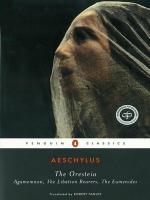|
|
The Eumenides Notes & Analysis
The free The Eumenides notes include comprehensive information and analysis to help you understand the book. These free notes consist of about 60 pages (17,808 words) and contain the following sections:
These free notes also contain Quotes and Themes & Topics on The Eumenides by Aeschylus.
The Eumenides Plot Summary
After murdering his mother, Clytaemnestra, and her lover, Aegisthus, Orestes flees Argos and goes to Delphi. There, he seeks protection at the Temple of Apollo because the avenging Furies are tormenting him, infuriated that Clytaemnestra has been slain. Orestes doesn't think that he deserves any punishment for his actions, since he was merely avenging the death of his father Agamemnon, whom Clytaemnestra slew in the bathtub after the Trojan War. In Delphi, Apollo puts the Furies to sleep and instructs Orestes to journey now to Athens, where Athena will offer him greater assistance. He even sends Hermes along to assure that Orestes arrives there safely. After Orestes' departure, Clytaemnestra's ghost appears, demanding revenge for what Orestes has done to her. Frantic, the monstrous creatures awaken and dash away to Athens, joined by Apollo, who still insists that the Furies must leave this man alone.
Athena, the Greek goddess of wisdom, goes to her temple high up on the Acropolis hill in Athens where Orestes has begged for her to help him. She listens to Orestes' appeal for help but also admits that the Furies have a strong case as well, accusing Orestes of murdering his own mother, a blood relative. Athena declares that she will establish a courtroom there on the Acropolis to decide if Orestes shall be convicted or not, judged by twelve Athenian male citizens whom she shall choose from among the general populace. She adds that Orestes' trial shall serve as a model for handling other accused criminals in the future as well. Upon returning with the jurors, she first asks the Furies to repeat their accusations against Orestes, that he murdered a blood relative, and he should be punished for this atrocity. Athena then allows Orestes the opportunity to defend himself, and he insists again that it was his duty to avenge his father's death, whom Clytaemnestra had murdered.
Apollo then testifies on behalf of Orestes, stating that mothers are not true blood relatives of their children. He compares the mother to a fertile field that a man plants his seed into so that the child can grow, using Athena as an example to prove this point. She was born out of Zeus' head without the assistance of any other woman at all. Apollo insists that, since mothers are not blood relatives of their children, Clytaemnestra is not a blood relative of Orestes and therefore he is freed of any punishment. Having concluded these arguments, Athena prompts the jury to vote to convict or acquit Orestes. When the vote is evenly divided between them, this goddess breaks the tie by favoring Orestes, freeing him from any punishment. Overjoyed, Orestes vows that people in Argos shall forever be allies with the people in Athena's favorite city, Athens.
The Furies are enraged that they have lost, threatening to bring sickness to Athens, but Athena calms them down by offering to share the job of ruling the city. The Furies accept this offer and become protectors of Athens, now called the Eumenides or the "Benevolent Ones." They descend from the Acropolis to golden thrones underground that Athena has prepared for them. This tale of sadness ends with a new promise of hope for Athens. Athena and the powerful Eumenides now protect the city with their divine powers, a virtuous court is established on the Acropolis to punish lawbreakers rather than people taking the law into their own hands, and Orestes vows that the citizens in his city, Argos, shall always aid Athens in any way that it can.




